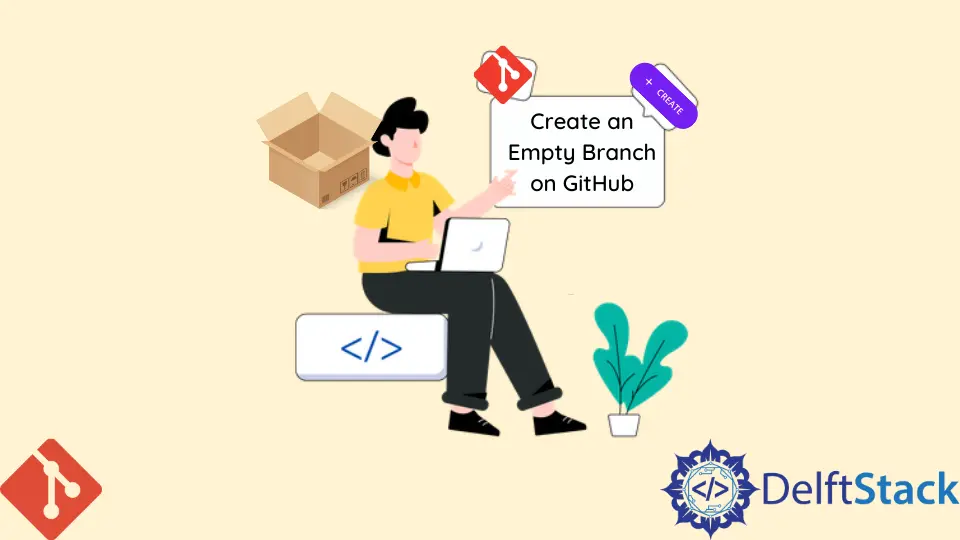How to Create an Empty Branch on GitHub
- Understanding the Basics of Git Branches
- Method 1: Create an Empty Branch Locally and Push to GitHub
- Method 2: Creating an Empty Branch Directly on GitHub
- Conclusion
- FAQ

Creating an empty branch on GitHub can be a useful technique, especially when you want to start fresh without carrying over any existing changes. Whether you’re working on a new feature, fixing a bug, or just organizing your project, understanding how to create an empty branch is essential.
In this article, we will delve into the straightforward steps to create an empty branch and push it to GitHub. By the end of this guide, you will have a clear understanding of the process, allowing you to manage your GitHub repositories more effectively.
Understanding the Basics of Git Branches
Before diving into the creation of an empty branch, let’s clarify what a branch is in Git. A branch in Git is essentially a pointer to a specific commit in your repository’s history. It allows you to work on different features or fixes in isolation without affecting the main codebase. When creating an empty branch, you start with no commits, which can be beneficial for various reasons, such as testing new ideas or structuring your project differently.
Method 1: Create an Empty Branch Locally and Push to GitHub
Creating an empty branch locally is a straightforward process. First, you need to ensure you have your local repository set up. Here’s how to do it:
- Open your terminal or command prompt.
- Navigate to your local repository using the
cdcommand. - Use the following Git commands to create an empty branch.
git checkout --orphan new-branch
git rm -rf .
git commit --allow-empty -m "Initial commit on new empty branch"
git push origin new-branch
The first command, git checkout --orphan new-branch, creates a new branch named new-branch without any previous commits. This means it starts as an empty branch. The second command, git rm -rf ., removes all files from the current working directory, ensuring the branch remains empty. The third command creates an empty commit with a message, which is necessary for pushing the branch to GitHub. Finally, git push origin new-branch pushes the new empty branch to your GitHub repository.
Output:
Branch 'new-branch' set up to track remote branch 'new-branch' from 'origin'.
This method is effective for starting new features or organizing your project without any pre-existing code. You now have an empty branch on GitHub that you can begin to populate with new commits as needed.
Method 2: Creating an Empty Branch Directly on GitHub
If you prefer to create an empty branch directly on GitHub, you can do so through the GitHub interface. This method is particularly useful if you want to avoid using the command line. Here’s how to create an empty branch directly on GitHub:
- Go to your repository on GitHub.
- Click on the branch dropdown menu, usually located at the top left of the file list.
- Type the name of your new branch in the text box.
- Select “Create branch: new-branch” from the dropdown.
After creating the branch, you might want to make it empty. To do this, go back to your local repository and pull the new branch. Then, you can follow the steps from the previous method to remove all files and create an empty commit.
git checkout new-branch
git rm -rf .
git commit --allow-empty -m "Initial commit on new empty branch"
git push origin new-branch
Output:
Branch 'new-branch' set up to track remote branch 'new-branch' from 'origin'.
This method is particularly helpful for teams or individuals who prefer a graphical interface over command-line operations. Once you have created your empty branch, you can start adding commits as needed.
Conclusion
Creating an empty branch on GitHub is a valuable skill for any developer. Whether you choose to do it locally via Git commands or directly through the GitHub interface, the process is relatively simple and straightforward. By following the steps outlined in this article, you can effectively manage your branches, keeping your project organized and your workflow efficient. Remember, the key to successful version control is understanding how to utilize branches to isolate your work.
FAQ
-
What does an empty branch mean in Git?
An empty branch in Git refers to a branch that has no commits associated with it, allowing you to start fresh without any previous changes. -
Can I create an empty branch in GitHub without using the command line?
Yes, you can create an empty branch directly on GitHub through the web interface, and then you can make it empty by removing all files and creating an empty commit. -
Why would I want to create an empty branch?
Creating an empty branch can be useful for starting new features, testing ideas, or organizing your project without carrying over any previous code. -
How do I switch back to my main branch after creating an empty branch?
You can switch back to your main branch using the commandgit checkout mainorgit checkout master, depending on your repository’s default branch name. -
Is it possible to delete an empty branch?
Yes, you can delete an empty branch using the commandgit branch -d branch-namefor local branches andgit push origin --delete branch-namefor remote branches.
John is a Git and PowerShell geek. He uses his expertise in the version control system to help businesses manage their source code. According to him, Shell scripting is the number one choice for automating the management of systems.
LinkedIn